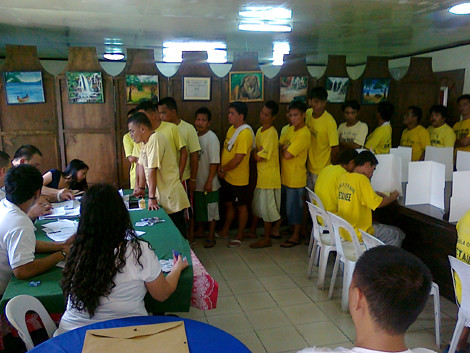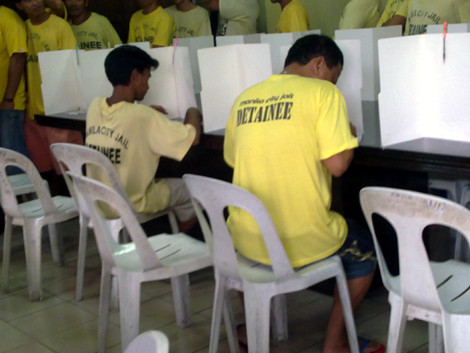When someone mentions the word "jail," we almost immediately think of chaos and violence. However, on Monday, the Manila City Jail (MCJ), known as the home of "war freak" gangs Sigue-sigue and Sputnik among others, turned into a peaceful polling precinct. The 556 inmates who registered to vote — clad in yellow shirts, some in shorts while others in pants — patiently lined up and waited for their turn to cast their vote. Outside the conference room, converted into a special polling precinct, there were no sample ballots scattered on the floor nor posters of candidates plastered on the walls. There were no candidates trying to shake a voter’s hand to secure a vote. The conduct of the voting inside Manila City Jail, home to some 4,000 detainees, was more orderly and peaceful than other polling precincts in the country. Only 20 detainees were allowed inside the voting room while the others were asked to line up outside to avoid overcrowding. Some 50 jail officers were on hand to monitor the voting. After voting, the inmates were escorted back to their cells.

Detainees at Manila City Jail line up to cast their votes. Amita Legaspi
Emerging from the polling precinct, Raymond Sahagon was happy that he once again had an opportunity to elect leaders. He also participated in the May 10 national and local elections.
“Masayang masaya po dahil kahit papaano nagkaroon kami ng opportunity na makapamili kung sino yung gusto naming kandidato kahit nandito kami sa loob ng kulungan," he said. Sahagon has been detained at the MCJ for more than six years. He added:
“Masaya po kami na makapili ng bagong lider na alam naming makakatulong sa aming barangay." (We are happy that we can choose a new leader whom we know could help our barangay.) This was also the sentiment of Arlene Pacia, who has been in jail since 2007.
“Masaya po ako kasi kahit papaano kaming mga nakakulong po ay nakaboto sa aming mga barangay, sa pamamagitan nito ay maaari naming masuportahan ang barangay namin," she said. (I am happy that somehow we who are in jail were able to vote in our village. Through this we can support our barangay.)

Manila city jail detainees cast their votes. Amita Legaspi
Loretta Ann Rosales, head of the Commission on Human Rights, and Director Rosendo Dial, chief of the Bureau of Jail Management and Penology, were happy, as well, with the conduct of the voting. The two officials oversaw the conduct of the voting. In an interview with GMANews.TV, Dial said they experienced more difficulty during the registration of the detainees than the actual election itself.
“Yung pagdadala ng inmate papunta sa Comelec kami nahirapan. Although may guidelines ang Comelec na sana, yung local Comelec, ang pupunta dito (sa jail)," he said. (The sending of inmates to Comelec, that was difficult. Although there were guidelines, I hope Comelec, the local Comelec, would have been the one to go to jail [for the registration of voters]). He admitted that they failed to bring the other inmates to the Comelec district offices for registration. He said the number of detained registered voters were lower in this election than last May, when there were 680 voters. Dial said some of the voters have already been released while those who have just been committed to the city jail were not included yet on the list. The other detainees also refused to register, Dial said. Out of the city jail's 556 registered voters on Monday, 319 were female and 237 were male.
“Dito ang pinakaorderly sa loob ng jail, organized sila e pag sinabi mo na upo, upo lahat yan. Pag sinabi mong tayo, tatayo lahat yan kaya well organized dito," the BJMP said. (It was most orderly here inside the jail, they were organized; when you tell them to sit, they will all sit. When you tell them to stand, they will all stand that's why it was well-organized here.) He cited the importance of allowing the inmates to vote.
“Hindi naman convicted ang mga iyan. They are still presumed innocent until proven otherwise kaya yung right nandiyan pa rin sa kanila although privileges are curtailed. Ang kanilang constitutional right ay nasa kanila pa rin at isa dito yung pagboto," said Dial. (They are not convicts. They are still presumed innocent until proven otherwise that's why they have their rights although their privileges are curtailed. They still have constitutional rights and one of these is the right to vote.) He added that even those detained in the New Bilibid Prisons in Muntinlupa whose conviction has not been acted with finality by the Supreme Court, can still vote.
Restorative justice In a press conference, Rosales pointed out that allowing the inmates to exercise their right of suffrage is valuable to the prisoners. Rosales said the voting exercise brings back the inmates’ confidence, self-worth and hope that one day they could go back to normal life and be accepted by society.
“To us, this is very very important because this is our way para mapaloob sa jail system yung tinatawag na restorative justice, in other words humanize the jail system," she said. (To us, this is very important because this is our way to include in the jail system what we call restorative justice, in other words, humanize the jail system.) She added many of the inmates go back to being criminals if restorative justice will not be practiced in the jails.
“We should inculcate human rights in jails. Yung pagiging makatao ang dapat ipakita hindi yung punitive lamang. Mahalagang malaman na me karapatang pantao ang preso kahit na sila ay nakakulong," Rosales said. She further said the BJMP and Comelec should get out of their way to make sure that detainees are registered.
18,000 inmates Last week, Rosales said the CHR formed teams to monitor the voting of 18,000 inmates in Monday's elections. Rosales formed at least six special teams to oversee the elections in six of the country's most populated jails. She said the teams will monitor the conduct of elections in jails in Manila, Valenzuela, Antipolo, Las Piñas, Bataan and Navotas. “We will expand beyond Metro Manila, we will concentrate on highly urbanized centers like Cebu and Davao because it’s easier for us to work out the registration system until we are able to institutionalize detainee voting," she said. She added:
“Sa jail system gagawin natin ang lahat ng paraan para maging makatao ang pamumuhay nitong mga preso at yung kanilang civil and political rights ay maprotektahan, napakaimportante nun." Aside from the special teams to monitor voting in jails, Rosales said quick reaction teams have been formed to respond to untoward incidents in various polling precincts. She said she has also instructed CHR regional offices to send teams to polling places in their respective districts to monitor the conduct of elections. Both Dial and Rosales said Philippines is the first country in Asia to allow detainee voting and the fourth around the world.
Special polling precincts The Commission on Election on Monday set up
two special polling precincts inside the MCJ to allow the registered voters, who were incarcerated for different crimes, to cast their votes. However, only one of the polling precincts opened on time due to the absence of one of the special board of election tellers (SBET). The ballots were also not delivered on time. The second SBET was completed around noon and continued with what was left behind by the other board which opened around 7:00 am and ended at noon. The SBET needed to close early to give the tellers enough time to segregate the filled up ballots depending on the barangays of the detainees. The tellers likewise had to bring the ballots to the respective BETs and precincts to be included in the counting. Because of this some of the detainees were not able to vote. The election officers could not explain the delay in the delivery of the ballots. Only 120 of the 237 registered male voters managed to cast their votes when the SBET decided to stop the voting period, Capt. Ricky Pegalan of the BJMP said.
– VVP, GMANews.TV 






